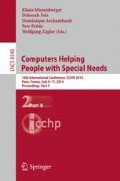Abstract
Since 2005, public policy in France has strongly been encouraging young people with disabilities inclusion within the regular school system. This has found a direct application through technical innovation, intended to help students being more independent within their learning activities. In this context, the purpose of this paper is to underline the manner in which using assistive information and communication technologies may improve the inclusive education for people with disabilities. The case study we present underlines the complexity of the social world into which the use of a precise assistive tool takes it place.
Access this chapter
Tax calculation will be finalised at checkout
Purchases are for personal use only
Preview
Unable to display preview. Download preview PDF.
References
Ando, B., Baglio, S., La Malfa, S., Marletta, V.: Innovative Smart Sensing Solutions for the Visually Impaired. In: Pereira, J. (ed.) Handbook of Research on Personal Autonomy Technologies and Disability Informatics, ch. 5, pp. 60–74 (2010)
Callon, M., Latour, B.: Unscrewing the Big Leviathans. How Do Actors Macrostructure Reality. In: Knorr, K., Cicourel, A. (eds.) Advances in Social Theory and Methodology: Toward an Integration of Micro and Macro Sociologies, London, Routledge (1981)
Draffan, E.A., Evans, D.G., Blenkhorn, P.: Use of assistive technology by students with dyslexia in post-secondary education. In Disability and Rehabilitation: Assistive Technology 2(2), 105–116 (2007)
Lopez-Krahe, J.: Introduction to Assistive Technology for the Blind. The European Journal for the Informatics Professional 8(2), 4–9 (2007)
Camis, C., Gross, N., Lamont, M.: Social Knowledge in the Making. University of Chicago Press (2011)
Mialet, H.: Hawking incorporated: Stephen Hawking and the Anthropology of the Knowing Subject. The University of Chicago Press (2012)
Rekkedal, A.M.: Assistive Hearing Technologies Among Students With Hearing Impairment: Factors That Promote Satisfaction. Journal of Deaf Studies and Deaf Education 17(4), 499–517 (2012)
Author information
Authors and Affiliations
Editor information
Editors and Affiliations
Rights and permissions
Copyright information
© 2014 Springer International Publishing Switzerland
About this paper
Cite this paper
Popescu, C. et al. (2014). EyeSchool: An Educational Assistive Technology for People with Disabilities - Passing from Single Actors to Multiple-Actor Environment. In: Miesenberger, K., Fels, D., Archambault, D., Peňáz, P., Zagler, W. (eds) Computers Helping People with Special Needs. ICCHP 2014. Lecture Notes in Computer Science, vol 8548. Springer, Cham. https://doi.org/10.1007/978-3-319-08599-9_32
Download citation
DOI: https://doi.org/10.1007/978-3-319-08599-9_32
Publisher Name: Springer, Cham
Print ISBN: 978-3-319-08598-2
Online ISBN: 978-3-319-08599-9
eBook Packages: Computer ScienceComputer Science (R0)

